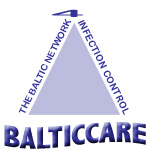Background
Two projects within The Task Force on Communicable Disease Control in the Baltic Sea Region (CBSS), “Surveillance of antibiotic resistance in the Baltic region” and “Creating templates for education in infection control with special reference to control of antibiotic resistance”, were approved and sponsored by the Swedish international development cooperation agency (Sida). Project holders suggested a joint activity between the two projects, as it is obvious that prevention of infection is an important step when tackling the problem with overuse of antibiotics and antibiotic resistance. A steering group for the joint project was appointed and a seminar in Riga was organised March 2004. Participants in the seminar were expertise from the 9 countries. .At the seminar international experts in the field gave state of the art lectures. At small workshops aim and structure for the future work was discussed and the idea of BALTICCARE was finally launched.
Structure
Steering group
A steering group (SG) is responsible for organisation and progress of the activities. The SG comprise one leading expert on infection control and one on clinical microbiology from each country.
Current members of the steering group are: Estonia: Paul Naaber Clinical Microbiology Tartu University Clinics, United Laboratories, Piret Mitt Dept. of Infection Diseases, Tartu University Clinics. Latvia: Arta Balode, Uga Dumpis Stradins University Hospital Riga. Lithuania: RolandaValintéliené, Public Health Research Dept., Institute of Hygiene Vilnius, Jolanta Miciuleviciene Kaunas Medical University Hospital, Microbiology Lab. North West Russia: Sergey Eremin Dept of Epidemiology, Mechnikov State Medical Academy, Marina Smirnova, Clinical microbiology, Mariinsky Hospital. Sweden: Anna Hambraeus, M.D. Ph.D, senior consultant, Ingegerd Kallings, Barbro Olsson Liljequist.
Advisory board
Seven internationally well known experts constitute an Advisory Board and are available for consultation.
Current members of the advisory board are:
Barry Cookson, Laboratory of HealthCare Associated Infection, Health Protection Agency, London, UK; Petra Gastmeier, Med Hochschule Hannover, Germany; Waleria Hryniewicz, Sera and Vaccines Central Research Laboratory, Poland; Gunnar Kahlmeter, Clinical microbiology Lab, Central Hospital Växjö, Sweden; Outi Lyytikäinen, Epidemiologist, Dept of Epidemiology, KTL, Helsinki, Finland; Matti Maimets, Infectious disease specialist, Head, Dept. of Infectious Diseases, Tartu University Clinics, Tartu, Estonia; Ludmilla Zueva, Head, Dept of Epidemiology, Mechnikov State Medical Academy, St.Petersburg, Russia.
Membership
Members are senior professionals, expertise in the fields with experience as teachers and teachers to be. All must be willing to work actively in the working groups. In addition to individual members, whole hospitals and other healthcare institutions may participate in the Network. They are called networking or partnership hospitals.
Activities
The concept of BALTICCARE is to work on projects in working groups. The Steering Group and the membership identify topics within the aims of BALTICCARE and of mutual interest for participating countries. Participants are invited to sign up for a topic and form a working group. The responsibility for each working group is to design and carry out a project addressing an issue that they prioritise in the suggested topic. It is a prerequisite that projects are chosen that are of urgent importance for hospitals in the countries. The list of current working groups see at the Workgroups page...



